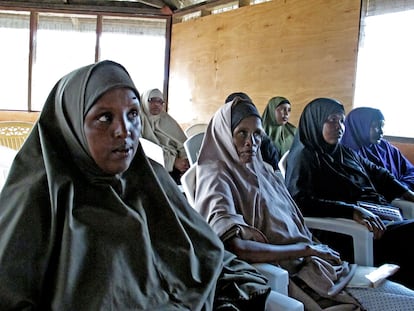Conflicted Normalities

Por: Faith Schwieker-Miyanzadi (journalist, M¨¦dicos Sin Fronteras, Nairobi, Kenya)
Where gender roles are clear, where men walk in and sit in a raw of their own, in a socially defined sitting arrangement. Where women, without word, take their side of the hall and sit calmly; listening and waiting. ¡°They want it like that.¡± I¡¯m told, so I have to leave for the women¡¯s side of the room: respect for culture, a fact one has to be very conscious about to live and work in this community.
Welcome to Ijara, an area prone to chronic recurrent drought and chronic malnutrition, high maternal mortality and high TB incidences. A district of about 87,771 people, where MSF has been working for two years now ¨C from 2010 to 2012 to promote sexual and reproductive health. This is the handover workshop held by MSF and other stakeholders.
Every day, approximately 800 women die from preventable causes related to pregnancy and childbirth. Here, Ijara Women. Women?s row, on the other side, the seats reserved for men. Faith Schwieker-Miyandazi / MSF
Illiteracy levels (in terms of formal education ¨C ability to read and write) in the area are quiet high and this affects the way people choose to access healthcare. I say choose because the decision of a woman to go to hospital, say, to deliver, does not necessarily lie with her but her husband/male partner. Therefore, if the husband is not convinced of the importance of institutional delivery, the woman will not get permission to go to hospital and therefore risks death in case of childbirth complications.
Moreover, there are traditional beliefs engrained in the community that haunt safe motherhood: For instance, for a long time, women in Ijara have lost their babies due to intrapartum haemorrhage or postpartum haemorrhage. Lack of knowledge made them always pin the cause of death to bad omens or the bad eye or other traditional beliefs.
Having gruntingly changed my sitting position earlier, to the women¡¯s side, I sit somewhat relaxed, observing, waiting to see how things would turn out as the hall fills up. The men¡¯s side is slowly filling up as there are more men than women in the hall; men continue to pour in and so do a few women. I turn my head to look behind from time to time. As the men¡¯s side fills up, I notice a woman take two more seats to the opposite side.
After a while four more men walk in and noticing the dearth of seats, take two more from the women¡¯s side. This went on for a while until one man came in and took a sit on the women¡¯s side ¨C I thought he must be a stranger to the community and waited to talk to him during the break just to confirm my thought ¨C he was a community member! I asked whether he¡¯d noticed that there was a pattern of sitting in the room, and he wasn¡¯t amused. He told me, ¡°yes, I noticed but I think the situation would have been worse if a woman sat on the men¡¯s side.¡± That was enough to tell me the place of women in this community.
Contrary to my fear, the participation of women during the meeting was good, especially considering their limited number. This could have been because they felt free to sit among themselves; to share and air their views and feel secure on their own side. This I appreciated.
After the meeting, the situation kept replaying on my mind forcing me to confront the scenario over and over again. In retrospect, I came to appreciate the situation. I mean, it doesn¡¯t really have to fit into my mindset or a particular way of doing things to be perceived as right, normal or working. I came to surely accept that this community has a way of going about their own things: they have a way of sitting at public forums, they have a way of airing their views at such forums and they have a system of conducting their business.
The situation might have seemed abnormal or unusual to me but it was apparently very normal to the others. So, whether I understand this or not, it works and it works for them. However, I haven¡¯t still lost hope that more men will take seats on the women¡¯s side or women on the men¡¯s side next time. With time, if this happens, I hope it would be realised that both gender can sit on either side and still be able to air their views in the same measure or maybe not, maybe never!
I know now, that normal to one, may not be normal to the other as normalities may conflict. However, if one norm works for a people without creating conflict and endangering a section of the community or stepping on the rights of the population, then isn¡¯t that a ¡®positive¡¯ norm?
My mind filled with such thoughts, I leave Ijara knowing that change is inevitable. It will take a while, maybe a short while, maybe a long while but change, whichever way it comes, will surely come and let itself felt. I just hope that when it comes, regardless of how it comes, it will not upset the strides already made by the community in health issues.
Comentarios
Tu suscripci¨®n se est¨¢ usando en otro dispositivo
?Quieres a?adir otro usuario a tu suscripci¨®n?
Si contin¨²as leyendo en este dispositivo, no se podr¨¢ leer en el otro.
FlechaTu suscripci¨®n se est¨¢ usando en otro dispositivo y solo puedes acceder a EL PA?S desde un dispositivo a la vez.
Si quieres compartir tu cuenta, cambia tu suscripci¨®n a la modalidad Premium, as¨ª podr¨¢s a?adir otro usuario. Cada uno acceder¨¢ con su propia cuenta de email, lo que os permitir¨¢ personalizar vuestra experiencia en EL PA?S.
En el caso de no saber qui¨¦n est¨¢ usando tu cuenta, te recomendamos cambiar tu contrase?a aqu¨ª.
Si decides continuar compartiendo tu cuenta, este mensaje se mostrar¨¢ en tu dispositivo y en el de la otra persona que est¨¢ usando tu cuenta de forma indefinida, afectando a tu experiencia de lectura. Puedes consultar aqu¨ª los t¨¦rminos y condiciones de la suscripci¨®n digital.
































































